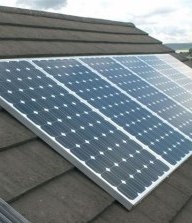More talk on promise of renewable energy
 (CNS): Successive governments in the Cayman Islands have continued to talk about developing renewable energy sources but as yet there has been little evidence of action regarding viable options. This latest administration has also joined the ‘talk’ and, following the visit to the Caribbean Renewable Energy Forum held in Montego Bay, Jamaica, last month, Minister of District Administration, Works and Gender Affairs, Juliana O’Connor-Connolly, said the UDP government would pursue renewables as a means of diversifying the islands’ generating sources, reducing energy bills, and minimizing impact on the environment.
(CNS): Successive governments in the Cayman Islands have continued to talk about developing renewable energy sources but as yet there has been little evidence of action regarding viable options. This latest administration has also joined the ‘talk’ and, following the visit to the Caribbean Renewable Energy Forum held in Montego Bay, Jamaica, last month, Minister of District Administration, Works and Gender Affairs, Juliana O’Connor-Connolly, said the UDP government would pursue renewables as a means of diversifying the islands’ generating sources, reducing energy bills, and minimizing impact on the environment.
O’Connor-Connolly said that the team attended the conference to gain greater insight into alternative energy sources, including waste-to-energy, solar and wind technology. She said priority areas that would promote the use of renewable energy included promoting solar energy and net metering of local homes, waste-to-energy measures, and hybrid electric cars.
As yet, the necessary amendments to the legislation to allow electric vehicles on Cayman’s roads have not been made. Nevertheless O’Connor-Connolly continued to say that the government would seek to move Cayman away from its dependence on oil.
“These technologies will allow Cayman to become more independent of the inevitable escalating oil prices while promoting cleaner, sustainable energy generation and more jobs for locals in a diversified industry,” she added.
The team included West Bay MLA Cline Glidden, Acting Deputy Permanent Secretary Tristan Hydes and Managing Director of the ERA Philip Thomas.
The Caribbean Renewable Energy Forum was designed to impel renewable energy implementation across the region.
Among its objectives were to define the regional energy market; pinpoint the bottlenecks in legislation,tariffs, technology, political will and finance and work towards solutions; introduce world class renewable energy technology to the Caribbean, and facilitate long term local and international investment in regional sustainable energy projects.
The forum was also aimed at exploring and encouraging energy conservation strategies across the region.
Category: Science and Nature


Love the caption! "MORE TALK on promise…"
Any move forward by the government in adopting policies which encourage the integration of renewal energy technologies should not only be welcomed with open arms but should be strongly supported by everyone throughout the islands. True, not everyone will be able to afford their very own renewable energy installation however, if the government was able to renogotiate the transmission and distribution monoployagreement, this might allow for the development of local community energy co-operatives or district located solar / wind farms. The government could easily get the ball rolling by adopting a renewable energy portfolio standard (REPS), in otherwords, set the goal of a date in which a percentage of the countries electrical generation will be generated by renewable energy technologies. As an example; On November 17, 2008, Governor Arnold Schwarzenegger signed Executive Order S-14-08 requiring that California utilities reach the 33% renewables goal by 2020. Adopting our own REPS could lead to the adoption of renewale energy certificates (RECs) and power purchase agreements (PPAs) which would allow investers and individual generators to develop and sell the electricity that they generate through renewable technologies to third parties.
What is all this nonsense about renewable energy? Surely Miss Julie knows that God gave us fossil fuels so that a few of us could profit immensely!
o’connor-connolly on the environment????? well i gaurantee that nothing will happen on these issues over the next 4 years…
Nobody cannot afford the ridiculous cost of installing these solar panels and the like. The savings on electricty would take many years to start paying off the installation cost, especially because any units put back into the grid would only be paid for at a nominal and unfair rate.
The government doesn’t have the funds to pay for incentives to get people to be energy friendly. XXXX nothing will ever happen, until there is either a competitor to CUC or an honest government, neither of which I can see happening for a long time.
At least the previous Govt. removed the duties on these items to assist. As with all relatively new technology, items are expensive until they become more mainstream. Prices are slowly coming down as this becomes more available. No different than say when LCD TV’s became available.
Regarding the rate paid for power put back into the grid, do you expect to be paid what it is resold for? As a supplier you get paid wholesale and CUC sells it at retail. The same would happen if you sold mangoes to a supermarket. The retailer is the one taking more risk so they get more mark-up.
Not all of the Cayman Islands offers a buy back (even at an unfair rate), the sister islands has no provision to put power back on the grid.
The buy back rates should be at the lowest level of residential sales (including the fuel factor).